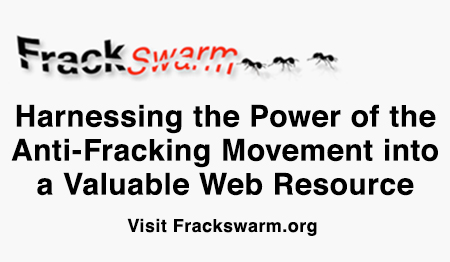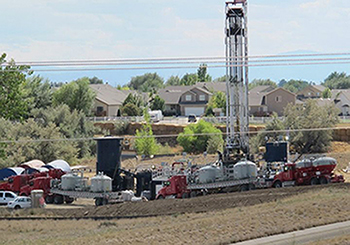FrackSwarm: Harnessing the Power of the Anti-Fracking Movement into a Valuable Web Resource
-- by Joshua Frank
 Snow drifts arc along the Interstate as a frigid wind rips through this austere landscape of western North Dakota. The scene is something out of a colorful and lonely C.M. Russell painting. If it weren't for the long line of semi-trucks backed up along Highway 85, leading into the nearby rural enclave of Williston, you may not have any idea there is something huge going on in this remote region that straddles Montana's eastern-most border.
Snow drifts arc along the Interstate as a frigid wind rips through this austere landscape of western North Dakota. The scene is something out of a colorful and lonely C.M. Russell painting. If it weren't for the long line of semi-trucks backed up along Highway 85, leading into the nearby rural enclave of Williston, you may not have any idea there is something huge going on in this remote region that straddles Montana's eastern-most border.
What's happening is so huge in fact that more than 40% of traffic in this once small agricultural town is now made up of big rigs that continually haul tens of thousands of gallons of water, sand, piping and other materials out to the nearby oil fields. And it's not just happening in North Dakota, currently there are 31 states that have active shale gas and oil reserves and utilize a technology known as fracking -- an earth shattering way to extract once unreachable oil and gas reserves from complex geological formations such as the Bakken formation near Williston, North Dakota.
Thanks in large part to the literally hundreds of groups sprouting up to challenge the boom, fracking has become a household word almost overnight. This new movement is one of the most powerful groundswells of anger and activism in recent memory, yet it remains fragmented and extremely under-resourced. That's why we've created FrackSwarm, a free information clearinghouse on all things related to the practice of fracking. The resource includes company profiles, state pages, scientific studies, government policies, lobbyists and more, FrackSwarm's open source wiki platform is constantly growing and expanding in content. As such, FrackSwarm is becoming an invaluable tool for those on the front lines in the battle to fight fracking and its perpetrators.
Like so many other environmental issues fracking too is controversial -- with a profit motive on one side and environmental and human welfare on the other. Who to believe? There is so much information swirling around in the media and at the dinner table it's often difficult to decipher the valid from the outlandish. One thing is for certain, however, all across the U.S. people are organizing and digging through the propaganda in hopes of uncovering the truth. These well-meaning folks are storming City Council meetings and lobbying their representatives in hopes of making the practice of fracking more transparent and therefore, more safe. And if it can't be safe, then they want it banned outright.
As proponents tout the practice's safety, others have been critical of fracking's potential harm to water quality, increased air pollution, contribution to climate change and much more. And even though the government has been pressured to research some of fracking's glaring environmental impacts, regulations have yet to be levied on the companies and states that are cashing in at an almost exponential pace. Meanwhile President Obama continues to praise its alleged virtues.
 Fracking rig close to neighborhood.To many observers, today's anti-fracking movement is at the same place where the anti-coal movement was at some 5-7 years ago with a boatload of anger and opposition but no highly developed movement to propel it forward into action. In 2008 CoalSwarm (FrackSwarm's predecessor) was formed to help weave these disparate energies into a powerful movement that brought powerful King Coal to its knees -- with over 170 plants cancelled and many more shut down for good. FrackSwarm aims to build the fracking movement in a similar way. Currently CoalSwarm has over 6,500 pages.
Fracking rig close to neighborhood.To many observers, today's anti-fracking movement is at the same place where the anti-coal movement was at some 5-7 years ago with a boatload of anger and opposition but no highly developed movement to propel it forward into action. In 2008 CoalSwarm (FrackSwarm's predecessor) was formed to help weave these disparate energies into a powerful movement that brought powerful King Coal to its knees -- with over 170 plants cancelled and many more shut down for good. FrackSwarm aims to build the fracking movement in a similar way. Currently CoalSwarm has over 6,500 pages.
Both CoalSwarm and FrackSwarm's pages are housed on SourceWatch, a 60,000-article open-source encyclopedia sponsored by the Center for Media and Democracy. CoalSwarm has been widely praised by activists, it is frequently utilized by students, journalists and lawmakers. Lester Brown of the Earth Policy Institute says, "CoalSwarm is the central nervous system that this movement [against coal] needed." Likewise we believe FrackSwarm will fill a similar void within the anti-racking movement, which, like the fight against coal, is diverse, dispersed and largely grassroots.
FrackSwarm's decentralized platform allows activists and others to update its content, while editors work to ensure the material is up to date, accurate and adequately sourced. Its unique in that FrackSwarm leverages the power of the grassroots: anyone can add information, all information is footnoted, the entire resource is linked smoothly from local to international content and it builds collaborative spaces among groups working on various issues related to fracking.
Fracking's opponents are up against a well-funded barrage of PR flacks and monied interests. The fracking boom is a lucrative one. While fracking is often associated with exploiting natural gas, it's also being used in places like North Dakota for oil, where production accounts for six percent of domestic product. This added boon to the economy has pushed the state into a large surplus. According to the North Dakota Petroleum Council, crude oil taxes on production and extraction bring in almost $750 million to the state per year. It's little wonder that the downside of fracking is something the profiteers want to keep quiet.
Currently, in the majority of states where fracking is taking place, there are no laws that make it mandatory for companies to reveal to the public the ingredients they use in their fracking fluids. Considered "trade secrets" the public has no way of knowing the types of chemicals being pumped into the ground, often near homes, schools and local bodies of water. How are we to know what fracking does to groundwater supplies, for example, if we don't even know what's being used? As long as it is a secret it will be kept off the books.
Even though FrackSwarm is in its infancy, we're already garnering accolades from those within the anti-fracking movement. Here's a sampling:
"Communities and activists should make use of FrackSwarm. Information about fracking is consciously used by industry to divide those trying to hold oil and gas companies accountable. FrackSwarm is a valuable information tool, but it's also a potential uniting force to make for more powerful advocacy coalitions."
-- Alan Septoff, Earthworks
"FrackSwarm provides a much needed service in our efforts to eliminate fracked oil and gas from our energy mix. Reports and studies are now appearing rapidly. For those new to the subject of hydraulic fracturing for oil and gas as well as for those who have been involved for much longer, consolidated sources of information will improve both our efficiency and the breadth and depth of our knowledge."
-- Kaye Fissinger, Board Member of Protect Our Colorado
As the movement against fracking grows, and as awareness of the dangers mounts, FrackSwarm will be well positioned to be the key information portal for the movement, especially for those in places like rural North Dakota where access to fracking's truth is often mired in money and politics.
FrackSwarm.org and Coalswarm.org are part of the interactive Sourcewatch wiki. Join the conversation and visit Frackswarm today!




